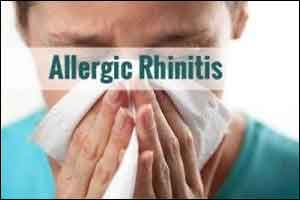- Home
- Editorial
- News
- Practice Guidelines
- Anesthesiology Guidelines
- Cancer Guidelines
- Cardiac Sciences Guidelines
- Critical Care Guidelines
- Dentistry Guidelines
- Dermatology Guidelines
- Diabetes and Endo Guidelines
- Diagnostics Guidelines
- ENT Guidelines
- Featured Practice Guidelines
- Gastroenterology Guidelines
- Geriatrics Guidelines
- Medicine Guidelines
- Nephrology Guidelines
- Neurosciences Guidelines
- Obs and Gynae Guidelines
- Ophthalmology Guidelines
- Orthopaedics Guidelines
- Paediatrics Guidelines
- Psychiatry Guidelines
- Pulmonology Guidelines
- Radiology Guidelines
- Surgery Guidelines
- Urology Guidelines
Antihistamines + LTRAs more effective than antihistamines alone in allergic rhinitis

Dr.Liu G, Zhou X and colleagues conducted a meta-analysis of randomised controlled trials to evaluate whether an adjuvant therapy of leukotriene receptor antagonists (LTRAs) based on oral H1-antihistamines (H1) can increase the efficacy of allergic rhinitis (AR) treatment. The researchers found that patients with allergic rhinitis (AR), leukotriene receptor antagonists (LTRAs) + H1-antihistamines (H1) may reduce daytime and composite nasal symptoms, including rhinorrhea, sneezing, and itching vs H1 alone.The findings of meta-analysis has been published in the Journal of Otolaryngology-Head and Neck Surgery.
The researchers conducted a meta-analysis after search on PubMed, EMBASE, and Cochrane Central Register of Controlled Trials and identified 8 randomised controlled trials (n=1886) that compared the efficacy of LTRAs plus H1 vs H1 alone in patients with AR. They evaluated daytime nasal symptoms, nighttime nasal symptoms, composite nasal symptoms, and eye symptoms.
The pooled results of all trials showed a significant reduction in total daytime (weighted mean difference [WMD], –0.11; 95% CI, –0.19 to –0.03) and composite (WMD, –0.12; 95% CI, –0.23 to –0.01) nasal symptoms in H1 + LTRAs group vs H1 alone group.The pooled results of 3 trials showed that H1 + LTRAs group had significant improvement in composite nasal congestion (WMD, –0.06; 95% CI, –0.12 to –0.01), rhinorrhea (WMD, –0.34; 95% CI, –0.53 to –0.14), sneezing (WMD, –0.30; 95% CI, –0.42 to –0.18) except for nasal itching (WMD, –0.11; 95% CI, –0.26 to 0.04) vs H1 alone group. No significant difference was seen in nighttime nasal symptoms and eye symptoms between the 2 groups.
It was concluded that the current evidence suggests that LTRAs + H1 can increase the therapeutic efficacy against daytime and composite nasal symptoms, including rhinorrhea, sneezing, and itching; however, it does not affect nighttime nasal symptoms and eye symptoms. The patients with perennial AR may benefit more from the combination therapy.
For further reference log on to : DOI: 10.1177/0194599817752624
Dr Liu GIndian Journal of Otolaryngology and Head and Neck Surgeryleukotrieneleukotriene receptor antagonistsnasal symptoms
Next Story
NO DATA FOUND

Disclaimer: This site is primarily intended for healthcare professionals. Any content/information on this website does not replace the advice of medical and/or health professionals and should not be construed as medical/diagnostic advice/endorsement or prescription. Use of this site is subject to our terms of use, privacy policy, advertisement policy. © 2020 Minerva Medical Treatment Pvt Ltd